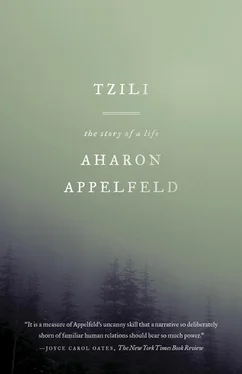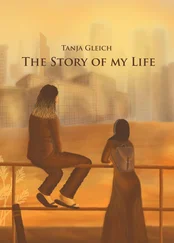“You’re Maria’s daughter, aren’t you?” he said and chuckled.
“Yes,” said Tzili, lowering her voice.
“So we’re not strangers.”
Maria’s name was a household word throughout the district. She had many daughters, all bastards. Because they were all good-looking, like their mother, nobody harmed them. Young and old alike availed themselves of their favors. Even the Jews who came for the summer holidays. In Tzili’s house Maria’s name was never spoken directly.
A number of years before, Tzili’s older brother had gotten one of Maria’s daughters into trouble. Maria herself had appeared in the shop and created a scene. For days, the family had consulted in whispers, and in the end they had been obliged to hand over a tidy sum. The mother, worn out with work, had refused to forgive her son. She found frequent occasions to refer to his crime. Tzili had not, of course, grasped the details of the affair, but she sensed that it was something dark and sordid, not to be spoken of directly. Later on, their mother forgave her brother, because he began to study and also to excel.
“Sit down,” said the blind man. “What’s your hurry?”
She approached and seated herself wordlessly by his side. She was used to the blind. They would congregate outside the shop and sit there for hours at a time. Every now and then her mother would emerge and offer them a loaf of bread, and they would munch it noisily. Mostly they would sit in silence, but sometimes they would grow irritable and begin to quarrel. Her father would go out to restore order. Tzili would sit and watch them for hours. Their mute, upraised faces reminded her of people praying.
The blind man seemed to rouse himself. He groped for his satchel, took out a pear and said: “Here, take it.”
Tzili took it and immediately sank her teeth into the fruit.
“I have some smoked meat too — will you have some?”
“I will.”
He held the thick sandwich out in his big hand. Tzili looked at the big pale hand and took the sandwich. “Maria’s daughters are all good-looking girls,” he said and snickered. Now that he had straightened the upper half of his body he looked very strong. Even his white hands. “I don’t like eating alone. Eating alone depresses me,” he confessed. He chewed calmly and carefully, as blind men will, as if they were suspicious even of the food they put in their mouths.
As he ate he said: “They’re killing the Jews. The pests. Let them go to America.” But he didn’t seem particularly concerned. He was more concerned with the coming harvest.
“Why are you so silent?” he said suddenly.
“What’s there to say?”
“Maria’s daughters are a cunning lot.”
Tzili did not yet know that the notorious name of Maria would be her shield from danger. All her senses were concentrated on the thick sandwich the blind man had given her.
Once Maria had been a customer at the shop. She was a handsome, well-dressed woman and she used city words. They said that Maria had a soft spot for Jews, which did not add to her reputation. Her daughters too had inherited this fondness. And when the Jewish vacationers appeared, Maria would have a taste of what it meant to be indulged.
Tzili now remembered nothing but the heavy scent Maria left behind her in the shop. She liked breathing in this scent.
The blind man said casually: “Maria’s daughters love the Jews, may God forgive them.” And he snickered to himself again. Then he sat there quietly, as if he were a cow chewing the cud.
Now there was no sound but for the birds and the rustling of the leaves, and they too seemed muted. The blind man abandoned his full face to the sun and seemed about to fall asleep.
Suddenly he asked: “Is there anyone in the field?”
“No.”
“And where did you come from?” The full face smiled.
“From the village square.”
“And there’s no one in the field?” he asked again, as if he wanted to hear the sound of his own voice.
“No one.”
Upon hearing Tzili’s reply he reached out and put his hand on her shoulder. Tzili’s shoulder slumped under the weight of his hand.
“Why are you so skinny?” said the blind man, apparently encountering her narrow shoulder bones. “How old are you?”
“Thirteen.”
“And so skinny.” He clutched her with his other hand, too, the one he had been leaning on.
Tzili’s body recoiled from the violence of the peasant’s embrace, and he threw her onto the ground with no more ado.
A scream escaped her lips.
The blind man, apparently taken aback by this reaction, hurried to stop her mouth but his hand missed its aim and fell onto her neck. Her body writhed under the blind man’s heavy hands.
“Quiet! What’s the matter with you?” He tried to quiet her as if she were a restless animal. Tzili choked. She tried to wriggle out from under the weight.
“What has your mother been feeding you to make you choke like that?”
The blind man loosened his grip, apparently under the impression that Tzili was too stunned to move. With a swift, agile movement she slipped out of his hands.
“Where are you?” he said, spreading out his hands.
Tzili retreated on her hands and knees.
“Where are you?” He groped on the ground. And when there was no reply, he started waving his hands in the air and cursing. His voice, which had sounded soft a moment before, grew hoarse and angry.
For some reason Tzili did not run away. She crawled on all fours to the field. Evening fell and she curled up. The blind man’s strong hands were still imprinted on her shoulders, but the pain faded as the darkness deepened.
Later the blind man’s son came to take him home. As soon as he heard his son approaching, the blind man began to curse. The son said that one of the shafts had broken on the way and he had had to go back to the village to get another cart. The father was not convinced by this story and he said: “Why couldn’t you walk?”
“Sorry, father, I didn’t think of it. I didn’t have the sense.”
“But for the girls you’ve got sense enough.”
“What girls, father?” said the son innocently.
“God damn your soul,” said the blind man and spat.
BY NOW TZILI’S memories of home were blurred. They’ve all gone, she said blankly to herself. The little food she ate appeased her hunger. She was tired. A kind of hollowness, without even the shadow of a thought, plunged her into a deep sleep.
But her body had no rest that night. It seethed. Painful sensations woke her from time to time. What’s happening to me? she asked herself, not without resentment. She feared her body, as if something alien had taken possession of it.
When she woke and rose to her feet it was still night. She felt her feet, and when she found nothing wrong with them she was reassured. She sat and listened attentively to her body. It was a cloudless and windless night. Above the bowed tops of the corn a dull flame gleamed. From below, the stalks looked like tall trees. She was astonished by the stillness.
And while she stood there listening she felt a liquid oozing from her body. She felt her belly, it was tight but dry. Her muscles throbbed rhythmically. “What’s happening to me?” she said.
When dawn broke she saw that her dress was stained with a number of bright spots of blood. She lifted up her dress. There were a couple of spots on the ground too. “I’m going to die.” The words escaped her lips.
A number of years before, her oldest sister had cut her finger on a kitchen knife. And by the time the male nurse came, the floor was covered with dark blood stains. When he finally arrived, he clapped his hands to his head in horror. And ever since they had spoken about Blanca’s weak, wounded finger in solicitous tones.
Читать дальше












